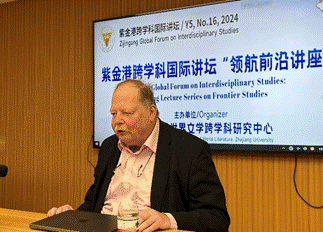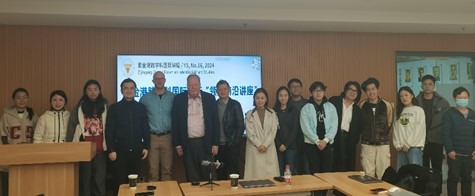On December 1, 2024, the 17th session of “Leading Lecture Series on Frontier Studies” of Zijingang Global Forum on Interdisciplinary Studies 2024, organized by the Institute for Interdisciplinary Studies of World Literature of Zhejiang University, was held successfully on Zijingang Campus, Zhejiang University. The event featured a keynote speech by Andreas Kablitz, member of the German National Academy of Sciences, Foreign Member of the National Academy of Sciences of Rome, and Professor at the University of Cologne. His lecture, titled “Language and Ontology: A Critical Revision of Western Metaphysics beyond Linguistic Turn and Deconstructionism,” sparked lively academic discourse. The lecture was moderated by Professor YANG Gexin, Director of the Institute for Interdisciplinary Studies of World Literature and attended by Professor ZHUANG Wei, a Tenured Associate Professor of German Studies, Researcher Will Greenshields of English Department, and undergraduates, postgraduates and doctoral candidates from the School of International Studies.

At the beginning of the lecture, Professor Kablitz guided the audience on an in-depth exploration of the philosophical implications of deconstructionism in the field of linguistics. He critically analyzed the deconstructionist theory that language constructs reality, arguing that this perspective might overlook the objectivity of reality and humanity's capacity to grasp it effectively. Professor Kablitz emphasized the historical significance of linguistics in reshaping our understanding of expression, consciousness, and the essence of reality. He then shifted focus to the evolution of ontology, particularly the philosophical exploration of the linguistic turn in ontology. Kablitz also elaborated on the enduring influence of Plato’s theories of thought and how the shift from theological to linguistic perspectives transformed the concept of truth. He highlighted a major philosophical shift: truth evolving from being a property of statements to becoming a relationship between entities. Additionally, Professor Kablitz analyzed the cross-cultural reception and transformation of philosophical ideas, underscoring the crucial role of historical and linguistic contexts in the development of ontological concepts. He observed that our our perception of reality is deeply shaped by linguistic structures. Language not only frames our understanding but may also obscure the true nature of existence. Therefore, professor Kablitz stressed the necessity of reexamining the universality and independence of ontological questions, paying closer attention to how linguistic systems influence our conceptualization of existence and our understanding of its essence. This perspective, he argued, offers a fresh lens for future philosophical research.

Professor Kablitz's lecture sparked lively discussions among the attendees. Researcher Will Greenshields posed a question centered on the concept of There’s nothing outside the text. In response, Professor Kablitz emphasized the significance of literary context in understanding academic language and how such terminology permeates literature curricula. He also highlighted the profound impact of academic language on literary theory. Expanding on this, Kablitz explored the limitations of language in conveying genuine emotions. He also expressed concern over the modern tendency to view everything as a linguistic game, which he believes has made it increasingly difficult for individuals to express love sincerely. Furthermore, he shared his keen interest in the role of mathematical language in describing reality. Associate Professor ZHUANG Wei addressed the nature of language as a discipline and the relationships between different subjects within language. He argued that language is not merely a tool for communication but also a field of study worthy of deeper exploration. Professor Kablitz agreed, stating that language has the power to challenge and reshape the way people accept concepts. He suggested that this perspective may stem from the theories of scholars like Humboldt, who emphasized the central role of language as a framework or medium within culture and society. The discussion extended further with insights from students LIN Xiao, ZHU Qiaorui, and SHI Yinan. They engaged with Professor Kablitz on topics such as Neoplatonism, Plato’s distinction between “epistēmē” (knowledge) and “doxa” (belief) and the relationship between language and rational behavior.
In conclusion, Professor YANG Gexin summarized that in the context of the new era, particularly in the rapidly advancing age of AI-driven intelligent data, it is essential to embrace new modes of competition. This requires a fresh reevaluation of fundamental questions such as “existence” and “reality.” Professor Kablitz’s commitment to reexamining the universality and independence of ontological issues undoubtedly offers a new perspective for future research in the humanities and social sciences.
The lecture is supported by the major project of the National Social Science Fund “Collation, Translation and Research of Contemporary Western Ethical Criticism Literature” [Project No. 19ZDA292].
“Zijingang Global Forum on Interdisciplinary Studies”, named after Zijingang Campus, the main campus of Zhejiang University, aims to provide an interdisciplinary platform for scholars engaged in humanities at home and abroad, especially those who are devoted to literary studies, to facilitate theoretical advancement, methodological innovation, intellectual promotion, and information exchange. As a foundational part of the Institute for Interdisciplinary Studies of World Literature, “Zijingang Global Forum on Interdisciplinary Studies” launches a series of academic activities and keeps its participants informed about current scholarship in the field. To be more specific, it consists of four major forums: “Leading Lecture Series on Frontier Studies”, “Leading Publication of Academic Achievements”, “Leading Forum on Interdisciplinary Studies for Young Scholars”, and “Leading Forum for University Students”.
Photos/Text: ZHANG Yixi
Organizer: Institute for Interdisciplinary Studies of World Literature, Zhejiang University
Translated by SUN Fangrui
Proofread by XU Xueying



